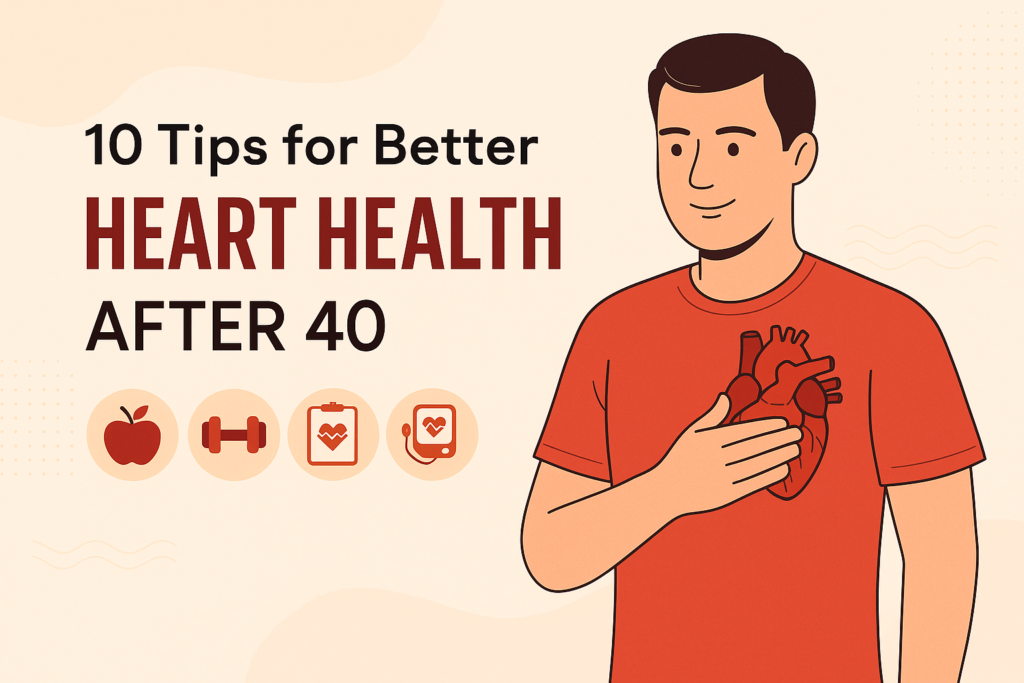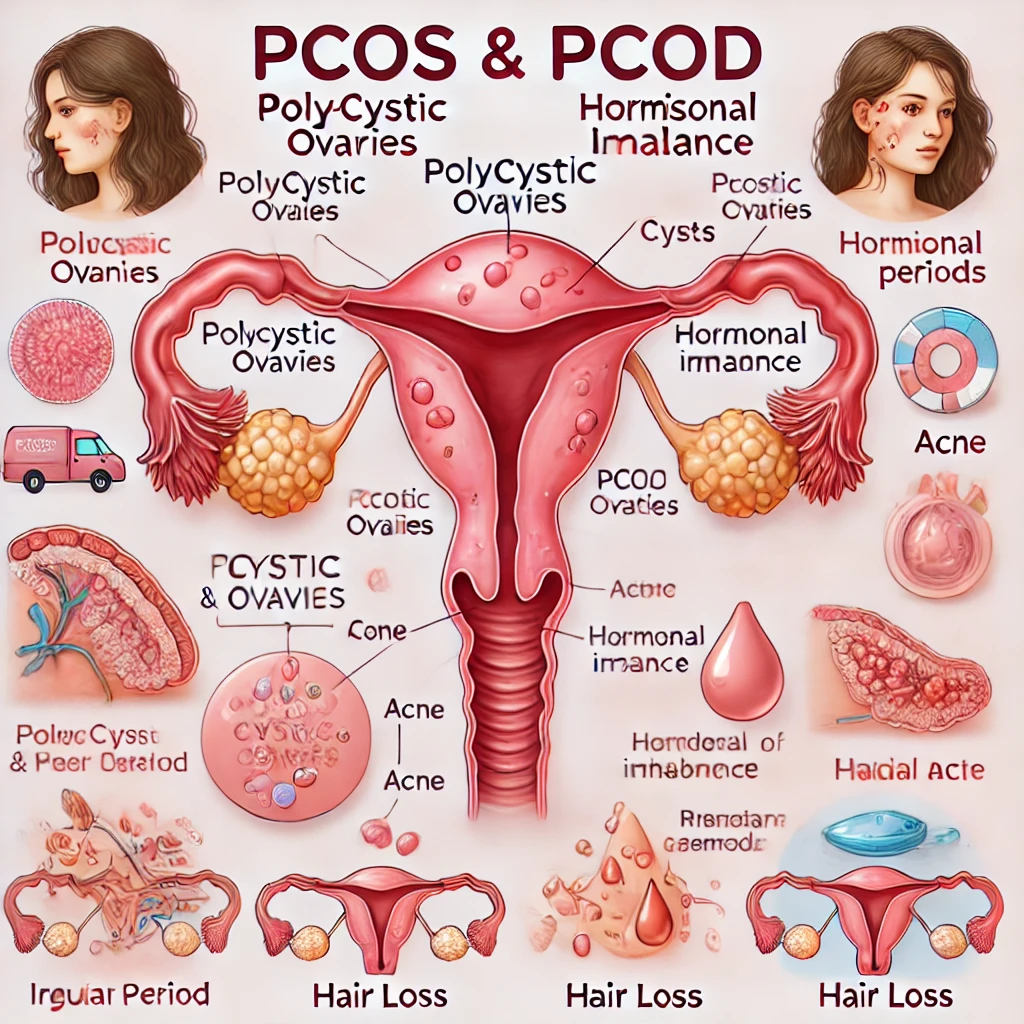Why Focus on Heart Health After 40?
After 40, your body undergoes hormonal shifts, metabolic slowdowns, and changes in blood vessel elasticity. These changes increase the risk of hypertension, cholesterol imbalances, and cardiovascular disease. But proactive steps can delay or prevent serious outcomes.

Key Takeaway: Starting in your 40s, your heart needs more intentional care. The earlier you start, the better the outcomes.
1. Prioritize Regular Physical Activity
Why It Works:
Movement strengthens your heart muscle, improves circulation, reduces blood pressure, and helps maintain a healthy weight.
Try This:
- Aim for 150 minutes of moderate aerobic exercise weekly (e.g., brisk walking).
- Add strength training twice a week to build lean muscle.
Bonus Insight: Studies show that walking 30 minutes a day can reduce the risk of heart disease by up to 35%.
2. Eat a Heart-Healthy Diet
Why It Works:
The food you eat directly influences blood pressure, cholesterol, and inflammation levels.
Power Foods:
- Fatty fish (rich in omega-3)
- Leafy greens
- Whole grains
- Berries
- Nuts and seeds
Watch Out For:
- Trans fats
- Excessive salt
- Sugary beverages
Pro Tip: Use the DASH or Mediterranean diet as a blueprint. Both are linked to reduced cardiovascular risk.
3. Get Quality Sleep (7–9 Hours)
Why It Works:
Poor sleep increases stress hormones, raises blood pressure, and affects glucose metabolism—all of which harm the heart.
Quick Wins:
- Stick to a sleep schedule
- Limit caffeine after 2 PM
- Create a wind-down routine
Data Point: People who sleep less than 6 hours per night have a 20% higher risk of a heart attack.
4. Manage Stress Effectively
Why It Works:
Chronic stress increases cortisol, raises blood pressure, and contributes to inflammation.
Proven Methods:
- Deep breathing or meditation
- Yoga or tai chi
- Regular physical activity
Real-Life Example: Professionals practicing 10 minutes of daily mindfulness reported lower resting heart rates and improved HRV (Heart Rate Variability).
5. Limit Alcohol and Quit Smoking
Why It Works:
Smoking damages arteries and raises blood pressure. Excess alcohol can lead to irregular heartbeat and hypertension.
Recommendations:
- Avoid tobacco in all forms
- Limit alcohol to 1 drink/day (women), 2 drinks/day (men)
Bonus Insight: Within a year of quitting smoking, your heart attack risk drops by half.
6. Stay on Top of Health Screenings
Why It Works:
Hypertension, high cholesterol, and diabetes often go undiagnosed—and untreated.
Checklist:
- Annual blood pressure check
- Fasting lipid panel
- Blood glucose/A1C
Pro Tip: Partner with a healthcare provider who emphasizes preventive care.
7. Maintain a Healthy Weight
Why It Works:
Excess weight puts strain on the heart and raises the risk of high blood pressure and Type 2 diabetes.
How to Start:
- Track calorie intake vs. activity
- Focus on nutrient-dense, low-calorie foods
- Use a wearable or app to stay accountable
Statistic: Losing just 5–10% of body weight can significantly improve heart markers.
8. Hydrate for Circulation
Why It Works:
Dehydration can reduce blood volume and make your heart work harder.
Aim For:
- At least 8–10 cups of water daily
- More during hot weather or exercise
Tip: Infuse water with lemon, cucumber, or mint to make hydration more enjoyable.
9. Build Social Connections
Why It Works:
Loneliness increases stress and is linked to higher heart disease risk.
Actionable Tips:
- Join local or online wellness groups
- Reconnect with old friends
- Volunteer for causes you care about
Study Insight: A Harvard review found that strong social ties reduce cardiovascular risk by nearly 30%.
10. Keep Learning and Stay Curious
Why It Works:
Engaging your mind boosts cognitive health and reduces stress—both vital for heart health.
Ideas:
- Read health-related books
- Listen to science podcasts
- Take a class or explore new hobbies
Note: Lifelong learning is associated with lower blood pressure and improved emotional well-being.
Future Applications of Heart Health Science
From wearable devices that track heart rate variability to AI predicting early heart disease, tech is transforming heart health. Apps now offer real-time EKG readings, while smart rings and watches flag irregular rhythms.
Emerging innovations include:
- Gene editing tools targeting cholesterol regulation
- Digital therapeutics for personalized lifestyle coaching
- Remote cardiac rehab programs for post-event recovery
Ethical Concerns and Considerations
Data Privacy and Device Dependence
As tech evolves, concerns grow around how health data is collected and used. Laws like GDPR and DPDP Act aim to protect personal health information, but user awareness remains key.
Risks Include:
- Biometric data misuse
- Over-reliance on digital trackers
- Unequal access to heart health technology
Global Solutions and Best Practices
Governments and global organizations are working toward:
- Standardizing heart health guidelines for public health
- Expanding access to screenings and preventive care
- Promoting food labeling regulations to reduce sodium and trans fats
Nonprofits and health bodies are also investing in community programs focused on:
- Active aging
- Nutritional literacy
- Affordable screening tools
FAQs
Q1: What’s the best first step to improve heart health after 40? Start with daily physical activity and improving diet. Small, consistent changes make the biggest impact.
Q2: Is coffee bad for heart health? Moderate coffee intake (1–2 cups/day) is generally safe and may even offer heart benefits.
Q3: Can supplements help? Omega-3s, CoQ10, and magnesium may help, but consult your doctor before starting any supplement.
Q4: How can I reduce salt without sacrificing taste? Use herbs, lemon juice, and spices like turmeric and garlic for flavor.
Q5: Are heart problems always genetic? Genetics matter, but lifestyle factors have a bigger impact—especially after 40.
Conclusion
Your 40s can be a powerful time to take control of your health. By adopting these heart-smart strategies today, you’re not just avoiding disease—you’re building a stronger, more vibrant future.
What change will you make first to improve your heart health? Let us know in the comments below!
References:
Ready to Stay Ahead? Bookmark our guide Technology and AI for updates!


